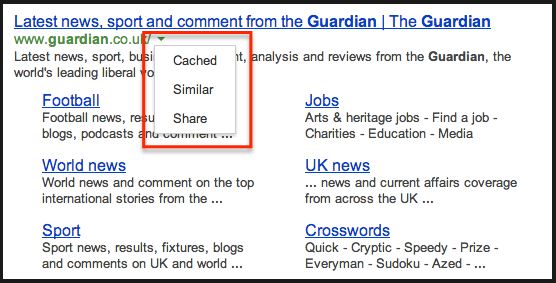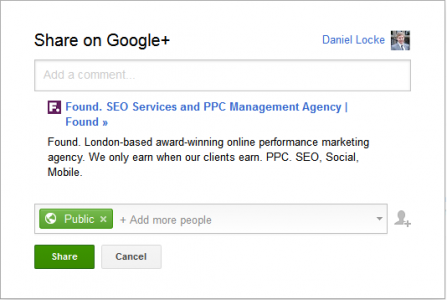Social search: Founders weigh in
Daniel Locke – Search Account Manager
Today, Thursday 25th April 2013 seems to have seen new functionality in Google search results pages with the addition of drop-down options next to results.
I’m not sure if he saw it first, but I’m crediting @paddymoogan for the spot – tweeting this screenshot first thing this morning:

The new options allow users to view cached pages, similar results to a particular URL as well as a share button (if you are logged in to a Google account).
What does this mean?
Not much at this stage, and there has been no word from Google as to confirm or announce this change. It’s also not clear if this is just Google experimenting and tinkering with SERPs, or a permanent change.
The new share option does makes it easier for users to share a website on Google but it’s a pretty safe guess your average searcher, at least at the time of writing, will a) not pay much attention to the arrow and b) not be bothered about sharing a URL on Google+. Something to keep an eye on.
Still, it’s yet more data for Google to play with and if nothing else, it’s another reason for any latecomers to get on board with their social platform.

Insight to similar search: The inclusion of an option to view similar results is puzzling. Only on Tuesday Google removed the related option from its search tools menu, citing lack of use. Perhaps moving it front and center is a last throw of the dice?
Changes like these are why it’s so important, (and challenging!) for agencies and search marketers to keep up-to-date and on the ball.
Jaume Polo Torné – SEO Intern:
Will these new options change search results?
Share button: This button is another attempt from Google to beat out Facebook and to bring users to G+. Social signals are becoming increasingly important as a ranking metric. If a page is shared straight from search results via this new share option, it can only be positive for the particular site because the page will increase positions, only if you are logged into your account.
Similar button: This button may or may not have negative effects for the page, I am not yet 100% sure. On the one hand, it could be hypothezised that if you choose to look a similar pages, it’s because the result returned did not satisfy your search. However, it could also be true that a user thought a result was good, and as such wanted want to view more similar pages. It would be interesting to know what analysis Google engineers will take, if any, from use of this button.
To sum up, we can say that the social search is here. These new options are aimed at bringing better results with social data from searchers. So, tasks have increased for SEO professionals. SEO is becoming less SEO and is now more like traditional marketing


